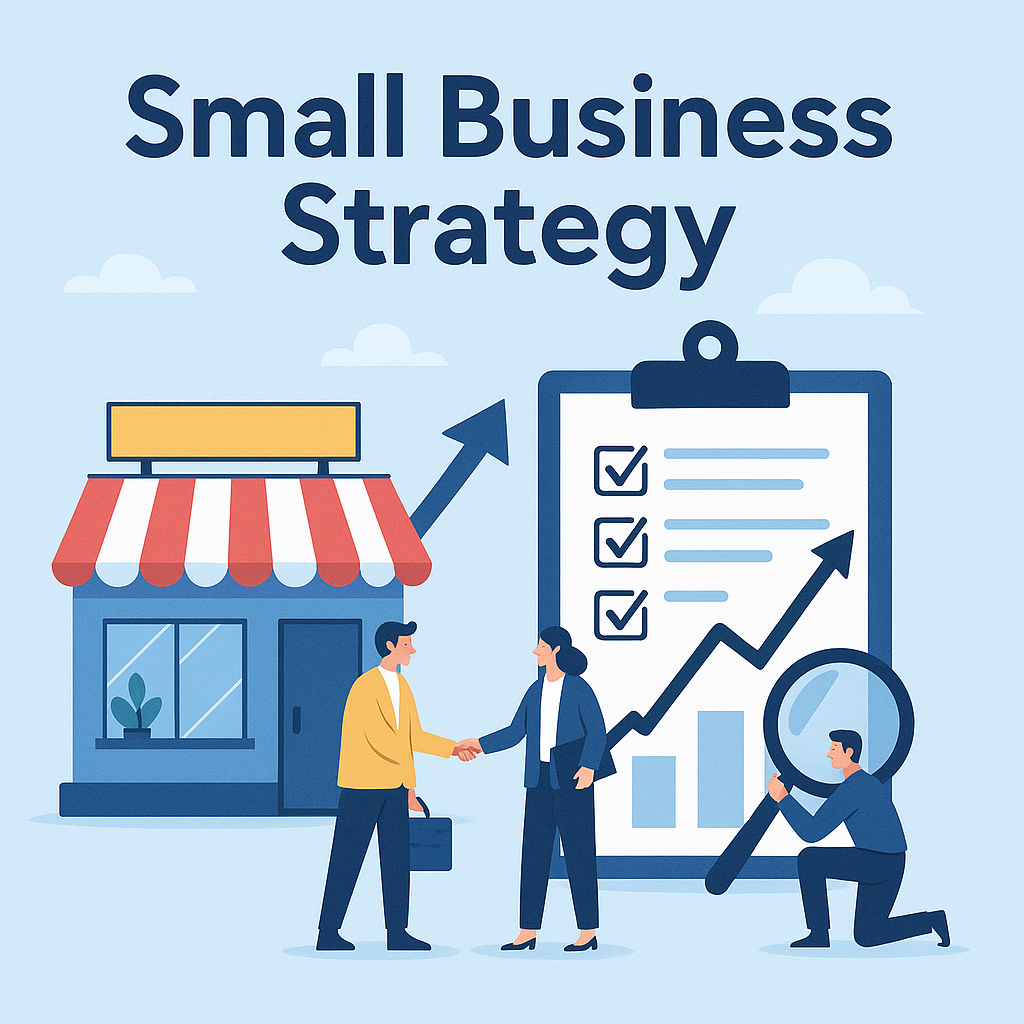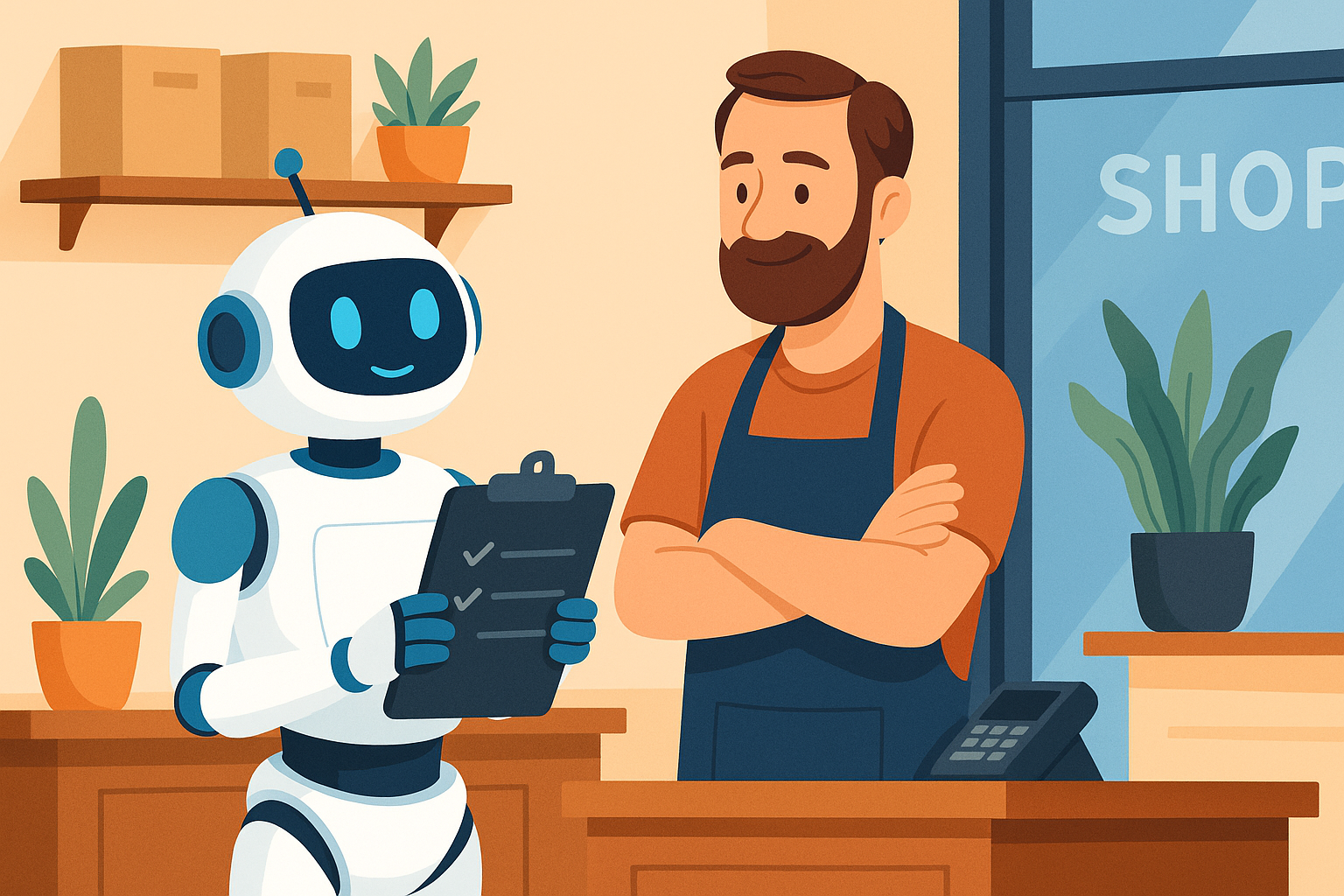Introduction
AI isn't just for giants.
Small businesses often struggle to compete with corporate giants due to limited resources and budget constraints. By 2025, businesses without AI tools risk falling behind as rivals use smart technology for better results.
Artificial intelligence isn't just for tech giants anymore—it's becoming a must-have for neighbourhood shops, cafés, and local services across the UK.
Feeling overwhelmed by all the AI talk? Don't worry. This article shows you practical ways small businesses can use AI today and tomorrow to stand toe-to-toe with bigger competitors.
The Small Business AI Revolution: How AI Will Transform Your Small Business by 2030
The Morning Routine Reimagined
Imagine 2030. Helen, a café owner in Manchester, begins her day as a silent electric lorry pulls up. Its AI-planned route has cut emissions by 30% compared to old delivery methods.
Helen checks her QR2U Beacon dashboard showing live customer ratings for menu items.
"Look at that—our new vegan pastries are getting brilliant reviews," she murmurs.
Without typing a word, she approves ingredient orders based on AI predictions that factor in an upcoming football match that usually brings in more customers.
The system has already sent personalised notifications to regulars. By 7:30 am, her morning prep is finished in half the time it took in 2023.
This future isn't a distant dream—it's where tools like QR2U's Beacon are already heading.
From Back-Office to Customer-Facing Applications
Behind the scenes, AI handles boring paperwork like bookkeeping and payroll. At the front, it creates experiences that make small shops feel as polished as major chains—when regulars scan QR codes at their table, they get personalised recommendations based on what they've enjoyed before.
"Remember when we had to guess what customers wanted?" Helen asks her staff. "Those days feel ancient now."
Most importantly, small businesses now compete head-to-head with larger corporations. This spread of technology has breathed new life into independent businesses on the high street.
Understanding AI: What Small Business Owners Need to Know
What can AI actually do for your corner shop or local service? Let's break it down in plain English:
Machine learning is like having an assistant who gets smarter every day—it spots patterns in your data that you might miss. QR2U's Beacon uses this to find themes in customer reviews.
Natural language processing is like teaching computers to read and understand human writing. It powers those helpful chatbots and tells you if reviews are happy or angry.
Computer vision is teaching computers to "see." Your shop could use it to track inventory from shelf photos or understand how customers move through your space.
Think of AI as a toolkit rather than a magic wand. The best part? Today's tools are built for normal people, not tech experts. You don't need a computer science degree to benefit.
Today's AI Tools: Practical Help for Small Businesses
5 Ways AI Improves Your Digital Presence Today
AI writes website copy and descriptions that Google loves—in seconds. Over 60% of small businesses report saving hours each week using AI-written content.
"I used to spend Sunday evenings writing social posts," says Jamal, who runs a bookshop in Leeds. "Now AI suggests ideas and the best times to post. My engagement is up 45%, and I get my weekends back."
QR2U automatically builds professional profiles for businesses like Soca Shack, giving them a proper digital home without expensive web designers.
How AI Makes Sense of What Your Customers Are Saying
Are you missing important messages hidden in your reviews? Beacon's analysis sorts feedback into positive, negative, or neutral categories, so you spot patterns at a glance.
It pulls out common phrases when multiple customers mention things like "slow service on Sundays" or "amazing vegan options."
Trend monitoring tools track how opinions change over time. The Kings Arms pub in Salford used this approach to track a 28% jump in service ratings after training staff based on AI-spotted issues.
"We thought we were doing fine until AI showed us what customers were really saying," explains the owner. "Now we know exactly what to fix."
3 Behind-the-Scenes Tools Worth Trying First
Smart inventory systems learn from sales patterns, seasons, and even weather. Research shows small shops using this tech cut waste by up to 30%. The Corner Grocer in Birmingham saved nearly £900 monthly by reducing spoilage.
Clever staff scheduling predicts busy times and suggests how many people you need working. The Thirsty Scholar in Manchester cut labour costs by 15% while actually serving customers faster.
Early warning systems for equipment failures. Martha's Bakery in Glasgow avoided a £3,000 repair bill when AI flagged unusual sounds from their main oven before it broke down completely.
Step-by-Step: Bringing AI Into Your Small Business
Pick one problem to solve first. For most service businesses, understanding customer reviews offers immediate insights with minimal setup. Tools like QR2U's Beacon take minutes to activate.
"I was drowning in feedback across five platforms," says Elena who runs a hair salon. "Getting it all in one place was a game-changer."
Set clear, measurable goals like "spend 3 hours less on review management each week" or "identify our top three customer complaints by next month."
Use what you already have. Your existing reviews, sales records, and customer data are gold mines—no need to create new information.
Look at what you're learning weekly and take specific actions based on those insights.
Compare before and after to see what's actually improving.
Watch out for platforms with poor support or confusing instructions. Join online groups where other small business owners share tips about the same tools you're using.
Most small businesses start seeing real benefits within 30-60 days, with clear financial returns usually appearing within three months.
Conclusion
Using AI in your small business isn't optional anymore—it's becoming as necessary as having a website or taking card payments.
Start small with user-friendly platforms like QR2U's Beacon that offer simple entry points to powerful capabilities.
Taking that first step today could mean the difference between struggling to keep up and leading your market tomorrow.
What might your business look like in two years with AI handling your tedious tasks while you focus on what you do best?
FAQ Section
What is AI and why should my small business care?
AI refers to computer systems that can perform tasks that normally need human thinking. For small businesses like yours, AI helps you compete with bigger companies by handling routine work and uncovering what customers really think. Primary advantages include saving time, making better decisions, and creating better customer experiences. Most modern AI tools are designed for regular business owners, not tech experts.
How much does adding AI cost for a small business?
Most small business AI tools work on monthly subscriptions ranging from £20-200. Companies like QR2U offer pay-per-click pricing with caps (£20/month) so you know exactly what you'll pay. The return comes from time saved (typically 3-10 hours weekly just on review management) and more income through keeping customers happy.
Do I need to be tech-savvy to use AI in my small business?
Not at all. Today's AI tools have simple interfaces with no coding needed. A 2023 survey found 78% of small business owners successfully set up basic AI tools without any IT help. "I was worried it would be complicated," says Raj, a florist from Bristol, "but it was easier than setting up my online banking."
What privacy issues should I watch out for when using AI?
Make sure you follow UK data protection rules, including getting proper consent for collecting data and keeping it secure. GDPR compliance matters when handling customer information. Choose companies with clear data protection promises. QR2U builds privacy protection into its design to help maintain your customers' trust.
How quickly will I notice results from using AI in my small business?
Review analysis tools give you insights almost immediately. Marketing improvements typically show results within 2-4 weeks. Efficiency gains usually become noticeable within 1-3 months. Everything works better as more data builds up, with most business owners seeing substantial benefits within three months of starting.
.jpg)



